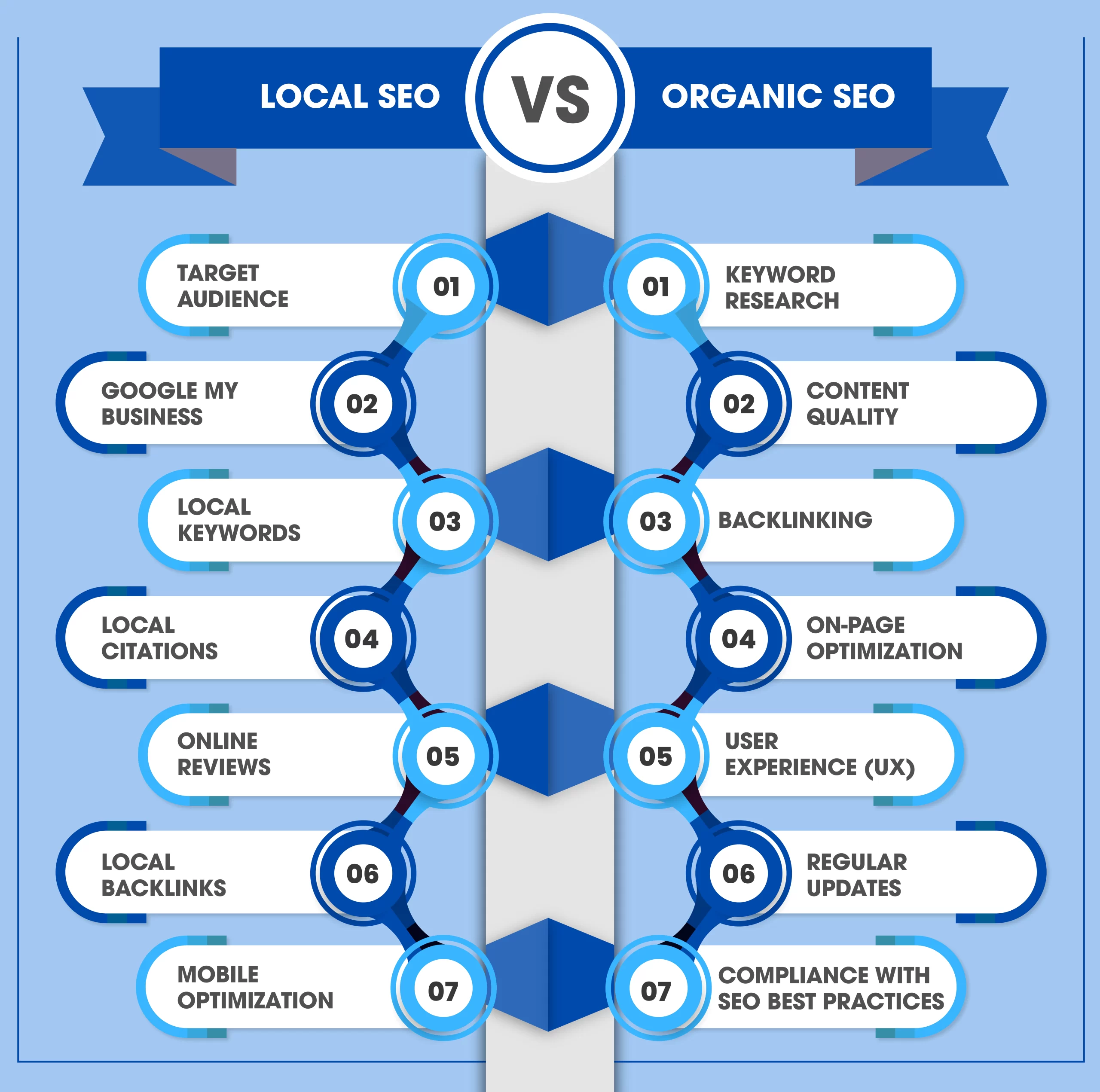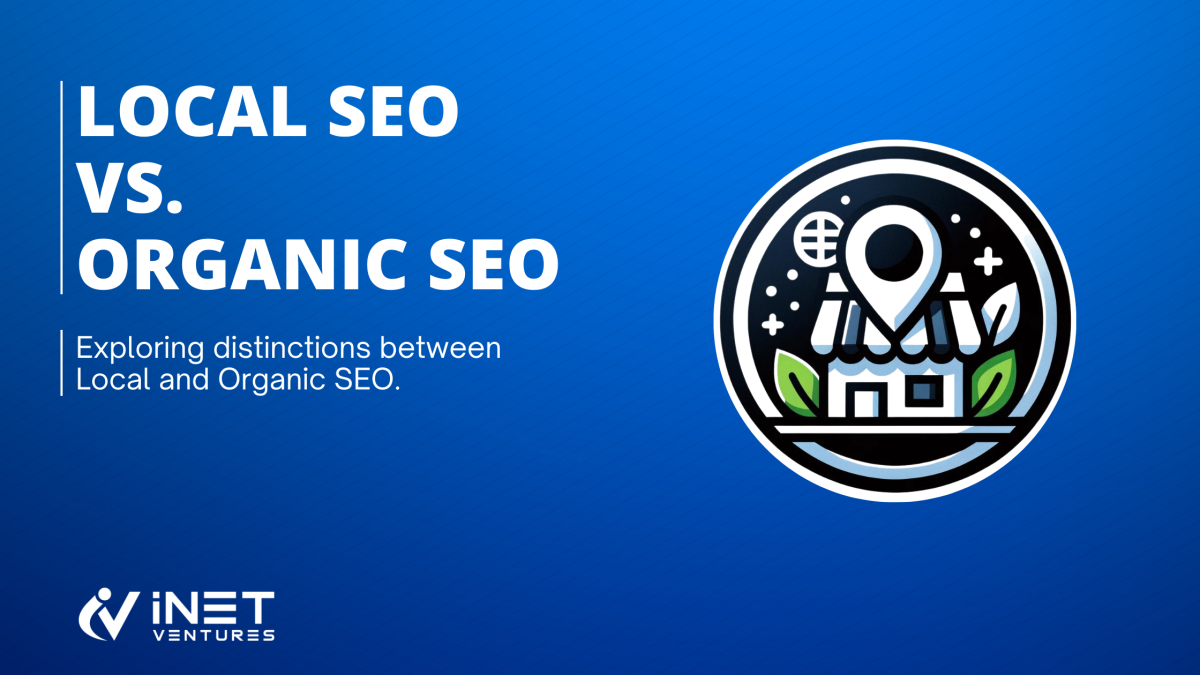On your travels, you’ve almost certainly come across the terms “local SEO” and “organic SEO”. These are both kinds of SEO (search engine optimisation) that target certain elements and aspects of your website and its content. Using them both is key to success, especially if you’re a locally-oriented business, but what do they both mean? When you put organic SEO vs local SEO, what differences do you notice, and how can you leverage those differences to your advantage?
We’re going to break down what local SEO and organic SEO are and how you can use them to benefit your business. The important thing is to achieve a balance between the two and to use them both where they’re most needed; don’t overemphasise one or the other (although organic SEO is definitely more important than trying to get artificial optimisation). Here’s the difference between local SEO and organic SEO.
What is local SEO?
First, let’s start with a definition of what local SEO is. If you’ve ever searched for something on Google, then you’ve probably seen a box near the top of the page that shows you local results for that query. This, in a nutshell, is why local SEO is important. If your business has any kind of local dimension to it (which most businesses do), then it’s extremely important to make sure you rank on Google’s local results, and that’s where local SEO comes in.
So, how do you optimise your page for local SEO? There are a number of ways you can do it. Here are some of the methods you can use for building a local SEO profile. These are just a few ways; there are lots more things you can do to optimise for local SEO, of course.
Optimising SEO for a digital marketing agency in Iowa is going to look different compared to working on an agency in London, but there are always common threads, so let’s take a look at how you can work on your local SEO to make your business the best it can be.
- Claim your Google Business profile. It’s completely free to create a business profile on Google Business, and doing so can help Google to know that you are who you say you are, which can in turn help with your rankings. The effort to reward ratio is completely skewed in your favour here, so make sure that you claim your business’ Google Business profile!
- Ask customers for reviews. Customer reviews are one of the biggest driving factors when it comes to other customers wanting to use your business. Think about it – when you use local businesses, you probably check reviews, right? That’s why it’s important to collect as many reviews as you can from satisfied customers (and talk to the ones who aren’t satisfied to resolve the situation).
- Emphasise your NAP. Your name, address, and phone number (NAP) should be consistent across as many listings as possible. If there’s any discrepancy in different instances of this information, Google will get confused, and your rankings will suffer. Make sure that wherever your business’ information is listed, your NAP is consistent.

What is organic SEO?
So, with the definition for local SEO out of the way, let’s move on and focus on organic SEO. If you guessed that organic SEO refers to building search engine optimisation for yourself naturally and not relying on underhanded or unscrupulous techniques, then you’re absolutely right. Organic SEO effectively means becoming relevant to Google through simply being useful to your site’s visitors and your customers.
It should be fairly obvious how you can build organic SEO at this stage, but let’s run down some of the methods you can use for doing this.
- Create relevant content. Simply put, the best way to build an organic SEO profile for yourself is to make sure that your content is relevant. Whatever you’re writing – be it a blog post, a social media entry, or anything else – make sure that it pertains to your industry or your business at all times. Don’t try to branch out randomly into other subjects, because Google frowns on doing that.
- Get natural backlinks. Rather than obtaining backlinks through unscrupulous methods, it’s important to try and get backlinks from other sites naturally. This should start to happen if your content is relevant and useful to users; sites will link you simply because you’re an authority in your chosen field, and eventually, you’ll build a backlink profile. It might take a while, but hard work will pay off.
- Make sure your metadata and tags are correct. Every time you create content, you should make sure that your metadata, your tags, and other supplementary information are all filled in and correct. This helps Google to find the content you’ve created, and it helps users to do so as well. It’s not difficult to make sure your metadata is accurate, so spending the time to do it is well worth it.
Organic SEO vs. local SEO: conclusion
In conclusion, the difference between organic SEO and local SEO should be pretty clear. Organic SEO refers to building a Google search profile for yourself organically rather than artificially, and local SEO refers specifically to building a profile in your local area. The truth is that the two complement each other rather well. Local SEO should be organic, and organic SEO should also contain an element of the local. Think of it this way: if you’re building a local profile for yourself, you should be doing so organically, and if you’re building an organic SEO approach (which you definitely want to do), then going through the local SEO optimisation process is an essential part of doing so.


